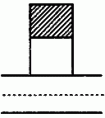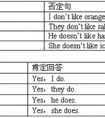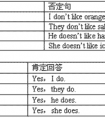按要求改写句子。1. We walk to school every day. (改为同义句) We go to school ________________ ________________ every day.2. Are these apples red? (改为同义句-六年级英语
题文
| 按要求改写句子。 |
| 1. We walk to school every day. (改为同义句) We go to school ________________ ________________ every day. 2. Are these apples red? (改为同义句) Are these ________________ ________________? 3. That is a light box. (改为复数句) ________________ ________________ light ________________. 4. I can speak English. (改为否定句) I ________________ ________________ English. 5. The apple is on the table. (对画线部分提问) ________________ the apple? |
答案
| 1. on foot 2. red apples 3. Those are, boxes 4. can't speak 5. Where's |
据专家权威分析,试题“按要求改写句子。1. We walk to school every day. (改为同义句..”主要考查你对 介词短语,复数名词,名词,指示代词,形容词,疑问副词 等考点的理解。关于这些考点的“档案”如下:
介词短语复数名词名词指示代词形容词疑问副词
考点名称:介词短语
- 介词:
是一种用来表示词与词,词与句之间的关系的词。在句中不能单独作句子成分。介词后面一般有名词代词或相当于名词的其他词类,短语或从句作它的宾语。
介词和它的宾语构成介词短语,在句中作状语,表语,补语,定语或介词宾语。
例: infrontof在……前面 infrontof意思是“在……前面”,指甲物在乙物之前,两者互不包括;
其反义词是behind(在……的后面)。
例:Therearesomeflowersinfrontofthehouse. 房子前面有些花卉。 - 常见类型:
1、介词+名词形式:
of course当然,自然,无疑 ;in detail详细地 ;on duty值班,上班
2、动词+名词形式:
take care小心,当心 ;tak ecare of照顾,照料 ;take place发生,进行
3、动词+介词形式:
ask for请求,要求 ;arrive at达成,得出 ; call for邀请,要求,需求
4、动词+副词形式:
come up走近,上来,发生,被提出 ; get in进入,收获,收集 - 小学常见介词短语:
1. wait for
等候 Wait for me. I want to go shopping with you.
2. help ---with---
帮------干------ I can help my mom with some housework.
3. at home
在家 He was not at home yesterday.
4. hold on
保持,别挂机 Hold on, please. He’s writing an e-mail in the study..
5. on foot
步行 I go to school on foot.
6. get to
到达 I usually get to school at 8:00 am.
7. get on
上车 Get on the No. 28 bus when it stops.
8. get off
下车 Get off at the third station.
9. turn on
打开 It’s dark in the room. Please turn on the light.
10.turn off
关闭 We should turn off the light before we leave.
11. on holiday
度假 My family are going to Canada on holiday.
12. play with
(与)------玩 I can play with the snow in winter.
13. a glass of
一杯 There is a glass of water on the desk.
14. put on
穿上 It’s cold today. Put on your sweater please.
15. take off
脱下 It’s hot now. Take off your coat.
16. put away
放好 Put away your books. We are going to have a P.E class.
17. look for
寻找 I am looking for my dog.
18. on time
准时 I get to school on time every day.
19. in time
及时 The man fell down. The doctors came in time.
20. go on a trip
去旅行 We are going on a trip tomorrow.
21. at night
在深夜 The policeman usually works at night.
22. be grateful to
感激某人 I am very grateful to my mother.
23. listen to
听------ I like listening to music.
24. pass ---to---
给------传递------ He passes the ball to Mike.
25. fly into
飞进------ The ball flies into John’s face.
26. run into
跑进…… I run into the hotel.
27. what for
为什么 But what for?
28. come on
加油! Come on!
考点名称:复数名词
- 复数名词:
指名词的数量大于“一”,如:two books, some students
名词变复数:
1、一般情况下,词尾加s。如:students,apples,bags,trees,books,brothers
2、s,x,z,sh,ch等结尾的名词,词尾加es。如:glasses,boxes,brushes,matches
3、y结尾的名词分两种情况,“辅音字母+y”结尾的名词,将y变为ies;
“元音字母+y”结尾的名词,直接在词尾加s。
以辅音字母加y结尾的名词,变y为i加es:cities,babies,enemies。
以元音字母加y结尾的名词,如:boys
4、f或fe结尾的名词,一般将f或fe变为ves。如:leaf-leaves, wife-wives, knif-knives
5、规则名词:foot→feet,tooth→teeth, child→children,man→men, woman→women,
sheep→sheep,deer→deer, mouse→mice. - 名词变复数规则:



![How does your brother go to school? He goes to school ____________. [ ]A. by bike B. by carC. by bus-五年级英语](http://www.00-edu.com/d/file/ks/4/1/43/2019-08-20/small940b9a2634b93a0ae1aa6ca778d2cbfd1566231712.jpg)
![— Where is the post office?— It's _______________. [ ]A. over thereB. rightC. left-五年级英语](http://www.00-edu.com/d/file/ks/4/1/43/2019-08-20/smalle16584bbab56a38aa7c4f818195959c91566231827.gif)

